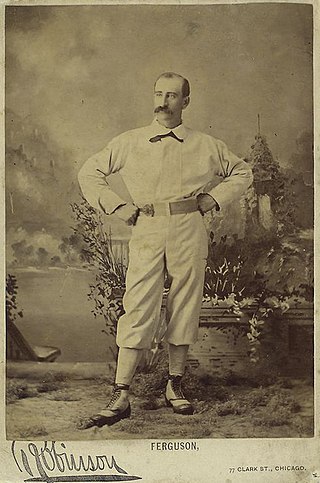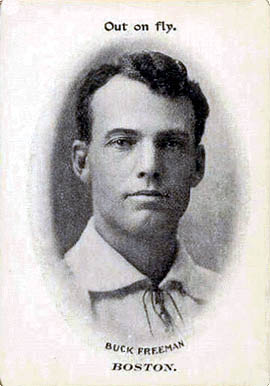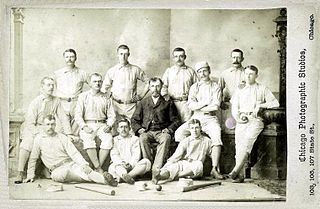Related Research Articles
The American Association of Base Ball Clubs (AA) was a professional baseball league that existed for 10 seasons from 1882 to 1891. Together with the National League (NL), founded in 1876, the AA participated in an early version of the World Series seven times versus the champion of the NL in an interleague championship playoff tournament. At the end of its run, several AA franchises joined the NL. After 1891, the NL existed alone, with each season's champions being awarded the Temple Cup (1894–1897).
The National Association of Professional Base Ball Players (NAPBBP), often known simply as the National Association (NA), was the first fully-professional sports league in baseball. The NA was founded in 1871 and continued through the 1875 season. It succeeded and incorporated several professional clubs from the previous National Association of Base Ball Players (NABBP) of 1857–1870, sometimes called "the amateur Association". In turn, several NA clubs created the succeeding National League of Professional Baseball Clubs, which joined with the American League of Professional Base Ball Clubs to form Major League Baseball (MLB) in 1903.

Robert Vavasour Ferguson was an American infielder, league official, manager and umpire in the early days of baseball, playing both before and after baseball became a professional sport. In addition to playing and managing, he served as president of the National Association of Professional Base Ball Players from 1872 through 1875, the sport's first entirely professional league. His character and unquestioned honesty were highly regarded during a period in baseball history where the game's reputation was badly damaged by gamblers and rowdy behavior by players and fans. However, his bad temper and stubbornness were traits that created trouble for him at times during his career, and caused him to be disliked by many. His nickname, "Death to Flying Things", was derived from his greatness as a defensive player.

Arthur Albert Irwin, nicknamed "Doc", "Sandy", "Cutrate" or "Foxy", was a Canadian-American shortstop and manager in Major League Baseball (MLB) during the late nineteenth century. He played regularly in the major leagues for eleven years, spending two of those seasons as a player-manager. He played on the 1884 Providence Grays team which won the first interleague series to decide the world champions of baseball. Irwin then served as a major league manager for several years.

John Frank "Buck" Freeman was an American right fielder in Major League Baseball at the turn of the 20th century. Listed at 5 ft 9 in (1.75 m) and 169 lb (77 kg), he both batted and threw left-handed. Freeman was one of the top sluggers of his era, his most famous feat being the 25 home runs he hit during the 1899 season.
The Washington Nationals of the 1870s were the first important baseball club in the capital city of the United States. They competed briefly in the National Association of Professional Base Ball Players, the first fully-professional sports league in baseball. The Nationals are considered a major-league team by those who count the National Association as a major league. Several other baseball clubs based in Washington, D.C., have also used the historic name Nationals.
The Baltimore Monumentals were an American baseball team in the short-lived Union Association. In their lone season of 1884, they finished fourth in the UA with a 58–47 record.

Fergus G. Malone was a professional baseball player in the 1860s and 1870s. He was the catcher for the Philadelphia Athletics in 1871, champion of the first professional league season.
The St. Paul Saints, also known as the Apostles or the White Caps, were a replacement Major League Baseball team that represented St. Paul, Minnesota in the short-lived Union Association, which existed for the 1884 season only. The team began the 1884 season in the Northwestern League as the Apostles. In September of that year, after compiling a 24-48 record, the team jumped to the Union Association along with the Milwaukee Brewers. The club finished its short stint in the Association with a 2-6-1 record in nine road games, earning the distinction of being the only major league team not to play a single home game. The team was managed by Andrew Thompson. Their normal home field was the Fort Road or Fort Street Grounds, also known as West Seventh Street Park.
Madison Avenue Grounds was a baseball ground located in Baltimore, Maryland. It was built by the Waverly Club as the first enclosed ballpark in Baltimore, with spectator seating and player clubhouses, and was the site of the first intercity game played in Baltimore on September 22, 1860; it was the site of a 47-7 defeat of the local Marylands by the undefeated Cincinnati Red Stockings in 1869, and it was used by the Washington Olympics for a professional game in 1871. On August 16, 1870, it was the site of an intercity game between black teams. It would continue to be used for games staged by black teams, in a time before there were any organized Negro leagues.
The Baltimore Marylands were a short-lived professional baseball team that existed in the 1873 National Association season. Their existence consisted of a six games from April 14 to July 11, and finished with a win–loss record of 0–6. In those six games, two of which were against the Washington Blue Legs and four versus the Baltimore Canaries, the team allowed 152 runs to score, while scoring 26 for themselves. The team was managed by Bill Smith, who also played in the outfield and at catcher. They played their one and only home game on April 14, at Madison Avenue Grounds, and officially folded after the July 11, 1873 game.
William Warren White was an American Major League Baseball player who played mainly third base for six different teams in his six seasons of professional baseball, five of which were in the National Association and one season in the Union Association.

Richard Joseph Padden, nicknamed "Brains", was an American professional baseball player, born in Wheeling, West Virginia, who played mainly as a second baseman in Major League Baseball for nine seasons from 1896 to 1905.

The Providence Grays were a Major League Baseball franchise based in Providence, Rhode Island from 1878 to 1885. During the team's eight seasons in the National League (NL), which then comprised eight teams, they finished third place or higher in the final standings seven times, and won the league championship in both 1879 and 1884. Providence played their home games at the Messer Street Grounds, which was located in the Olneyville neighborhood of Providence. The Grays were officially organized on January 16, 1878 by Benjamin Douglas, who became the team's general manager. Henry Root was hired as the team president‚ and Tom Carey was initially hired to be the on-field captain, whose duties were similar to the modern-day manager. On January 21, 1878, Providence applied for membership in the NL, and was officially approved on February 6. On April 10, Root took over ownership of the team, fired Douglas for incompetence and insubordination, and hired Tom York to replace Carey as captain.

John Francis Kelly was a Major League Baseball player. As a player, he was primarily a catcher, but also played 17 games as an outfielder and one game as a first baseman. He played for the Cleveland Blues of the National League in 1879 and 1882, both the National League Philadelphia Quakers and the American Association's Baltimore Orioles in 1883 and the Cincinnati Outlaw Reds and Washington Nationals, both of the Union Association in 1884, so that he played in three different Major Leagues in his four-year career.
John A. Bickerton was a Major League Baseball manager. He managed the final game of the season for the Washington Nationals, also known as the Washington Statesmen, of the American Association on August 2, 1884, replacing Holly Hollingshead The Nationals lost the game to the New York Metropolitans by a score of 6–5. That game proved to the final game in the franchise's history, as the franchise folded after the season after losing 51 of their 63 games.
References
- ↑ "Bickerton". Retrosheet . Retrieved 2009-12-06.
- ↑ "Game Log". Retrosheet . Retrieved 2009-12-06.